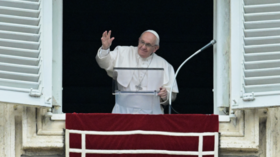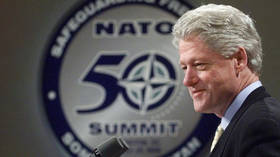Russians didn’t want to join NATO, US claims
The statement by US Secretary of State Antony Blinken contradicts what Russian President Vladimir Putin previously said
Russia “decided” it didn’t want to join NATO in the 1990s, even though “people talked about” it, US Secretary of State Antony Blinken told television host Stephen Colbert on his show on Thursday. Russian officials, including President Vladimir Putin, have maintained that their nation’s attempt to join the bloc was stonewalled by the West.
Blinken appeared on The Late Show to talk about the US’ Russia policy and the reasons Washington believes Putin was working against his own declared goals by attacking Ukraine.
“He wanted to prevent NATO from getting bigger with Ukraine. Now it actually is with Finland and with Sweden,” the US official said, referring to the membership applications that the two Nordic nations sent to NATO this week.
Colbert cited the opinion of Pope Francis that NATO’s expansion in Europe was partially to blame for the crisis in Ukraine, but the secretary said this was not the case.
“NATO is a defensive alliance,” he assured. “It has no aggressive intent against Russia. It’s never attacked Russia; it won’t attack Russia. It doesn’t intend to attack Russia.”
The host then suggested what he called a “crazy idea” that Russia should then be allowed to join NATO too. To that, Blinken said “back in the 1990s that was actually something that people talked about.”
“Well, the Russians decided that wasn’t what they wanted to do,” he added, as the audience laughed.
The same claim that Russia had a chance to become a NATO member but declined to do so has been made by a number of US officials, including President Bill Clinton, who wrote a Russia-blasting op-ed last month that mentioned the issue but disputed Putin’s accounts of exchanges with him.
In February, Putin recalled how during Clinton’s visit to Moscow in 2000 he asked his guest how the US would react if Russia asked for membership in the alliance. “The reaction to my question was very restrained,” he said
“Yes, NATO expanded despite Russia’s objections, but expansion was about more than the US relationship with Russia,” the former US leader wrote in his response. He added that, “[the US] left the door open for Russia’s eventual membership in NATO.”
Kremlin spokesman Dmitry Peskov commented on Clinton’s article in more definitive terms.
“I know for sure that the American side has repeatedly spoken about the impossibility of such membership. De facto, it was said that the doors, on the contrary, are closed, because it is fundamentally impossible,” he said.
Russia has repeatedly called out NATO, saying its expansion towards the Russian border posed a critical threat to Russian national security. During the build-up of tensions before the attack on Ukraine, Moscow made a last-ditch attempt to secure legally binding guarantees that Ukraine would not join the bloc but was told none would be given.
The US claimed that the open-door policy was essential for NATO, even though its founding document includes no such provision and, on the contrary, allows any member to block the accession of new members. Incidentally, this policy has taken on new relevance after Turkey threatened to veto the applications of Finland and Sweden.
Russia attacked the neighboring state in late February, following Ukraine’s failure to implement the terms of the Minsk agreements, first signed in 2014, and Moscow’s eventual recognition of the Donbass republics of Donetsk and Lugansk. The German- and French-brokered protocols were designed to give the breakaway regions special status within the Ukrainian state.
The Kremlin has since demanded that Ukraine officially declare itself a neutral country that will never join the US-led NATO military bloc. Kiev insists the Russian offensive was completely unprovoked and has denied claims it was planning to retake the two republics by force.







Comments are closed.